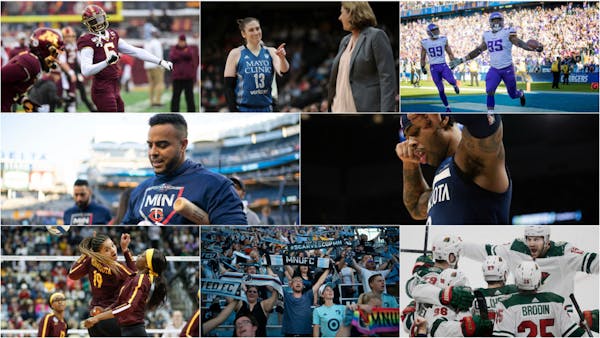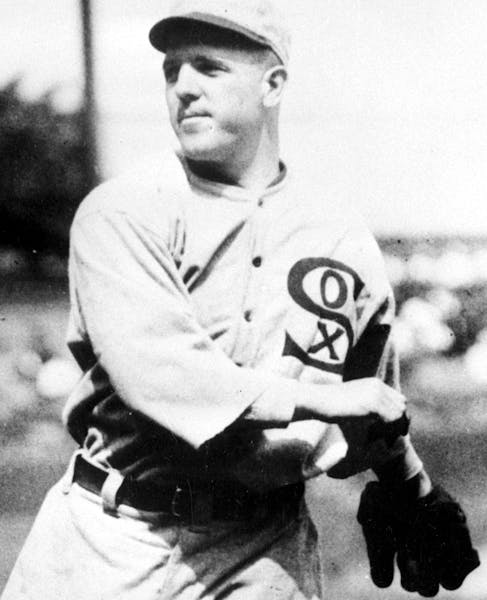Major League Baseball wishes it didn't have to quarantine itself from its fans if the 2020 season ever happens, but at least empty, silent stadiums will serve one decades-old, yet strangely modern-once-more, purpose: Nobody can get away with banging garbage cans to signal what pitch is coming.
This season will forever be smirched by an idled spring and spattered by the vacuum of vacant stands, all of it caused by a global pandemic. So it's easy to forget that it once appeared inevitable that 2020 would be defined by the sport's response to a scandal that impugned its integrity and cast doubt upon a couple of championships.
Not that that was so unique.
"When the pitch was signaled for a fastball or a curveball, they had arranged a predetermined signal to relay it to the batter," Hall of Fame slugger Hank Greenberg confessed in his autobiography, which was published three years after his 1986 death. "I think the record will bear it out. … I think it was picking up signs that were instrumental in enabling us to win that 1940 pennant."
And Bobby Thomson's "Shot Heard 'Round the World," the walkoff home run that won the 1951 NL pennant for the New York Giants? Thomson admitted to Joshua Prager, author of "The Echoing Green," that he and his teammates had stolen signs via telescope and an electronic buzzer in the bullpen for months that year, though he claimed it didn't happen on his home run, one of the most memorable in the sport's history.
Ralph Branca, the Dodgers righthander who threw the pitch, however, called it "the most despicable act in the history of the game."
Modern Dodgers fans feel similarly about the 2017 Astros, whose scheme replaced the telescope with TV cameras and the relay system with a bat and a garbage can. The Astros won 101 games utilizing their sign-stealing system, and eventually beat the Dodgers in a seven-game World Series. But while Thomson and his teammates kept their secret for almost 50 years, the Astros' plot was revealed last November.
After an investigation, MLB Commissioner Rob Manfred suspended Astros General Manager Jeff Luhnow and manager A.J. Hinch for a year, and both were subsequently fired by owner Jim Crane. But the players who took part — including current Twins utility player Marwin Gonzalez — were not disciplined. All-Star infielders Jose Altuve and Alex Bregman offered vague and insincere-sounding apologies, and Crane held a disastrous news conference in which he tried to assert that "our opinion is that this didn't impact the game."
A similar investigation revealed that the 2018 Red Sox, who beat the Dodgers in that year's World Series and were managed by former Houston coach Alex Cora, also had used their video room to steal signs, which were then relayed to batters via runners on second base. Cora was fired even before that investigation concluded, as was Mets manager Carlos Beltran, who played for the Astros in 2017 and has been called the ringleader of the cheating scheme. Again, no players were disciplined, though Boston's video coordinator lost his job.
Cheating allegations are almost as old as the game itself. Exactly a century ago, the major leagues banned the spitball as unfair, not to mention unhygienic. And some examples of rule-bending have become baseball lore, more hijinks than scandal.
Twins pitcher Joe Niekro, for instance, accused in 1987 of doctoring baseballs to make them break as they approached the plate, tried to surreptitiously toss an emery board and sandpaper away when umpires told him to empty his pockets on the mound. Niekro was suspended for 10 days.
On the edge
The sport has always had trouble determining the legality of sign-stealing, which sometimes is described as gamesmanship, sometimes defined as criminal. Former Twins manager Paul Molitor was acknowledged as a master of spotting tells and decoding signals, and while he said coyly in 2017 that "a lot of the advantage you get from that is just that the other side believing you know maybe more than you do," his players said they appreciated the occasional code-breaking.
But the abundance of technology in modern life has spilled over into the sports world, of course, which is where Manfred said he was drawing the line. "Our investigation revealed that clubs have employed various strategies to decode signs that do not violate our rules," the commissioner wrote in the Red Sox report. "The Red Sox' strategy violated our rules because of the use of an electronic device."
Yet that's not the case, not precisely. Unlike the NFL, which in 2007 fined New England Patriots coach Bill Belichick $500,000 for videotaping future opponents' offensive and defensive signals, MLB does not prohibit recording and analyzing signs on the field. What took the Astros and Red Sox cases from misdemeanor to felony was real-time usage of that information.
Teams can code-break a catcher's sequence of signs on videotape, and pass along that intelligence to their players. They just can't do it while the game — or at-bat — is in progress. No more garbage-can abuse, in other words.
Always rumors ...
Suspicions about the Astros, and other MLB teams, have been whispered about around the game for years. The Blue Jays a decade ago were accused of utilizing hotel rooms overlooking the field at Rogers Centre to relay information, and Giants broadcaster Mike Krukow, a former big-league pitcher, said on the air in 2013 that Rockies shortstop Troy Tulowitzki looked like he was never fooled by a pitch in Coors Field. "I swear he's getting signs," Krukow said on KNBR radio. "I'm not saying that he's doing anything, I'm not throwing it out there. … Kinda, sorta, yeah. But kinda."
The Twins have wondered about various opponents, too, though never publicly. They changed their signals before the playoffs began last fall, a practice that has apparently become widespread around the game.
To halt the suspicions, which Manfred believes damage the game's integrity, MLB officials visited each camp this spring and outlined a series of new protocols for clubhouse access during games. Twins manager Rocco Baldelli, President of Baseball Operations Derek Falvey and GM Thad Levine were briefed on possible rules, though MLB has reportedly not yet finalized them.
Cracking down
Those rules, according to Sports Illustrated, would ban nonuniformed employees from the clubhouse during games, and perhaps prevent players from using phones. Video-replay rooms would be limited to one or two video coordinators, connected only to the manager's phone in the dugout. A ban on clubhouse TVs during games is being considered, too, or at least an 8-second delay on telecasts to prevent relaying of information.
Those rules would represent a big change for modern big leaguers, who have gotten used to immediate analysis of their play. "We have a lot of players who like to go up and look at their at-bat, right away," Twins hitting coach Rudy Hernandez said. "What pitch did he throw me, how was my swing? Some guys put their bat in the rack and go right up to take a look. It can be helpful."
Some teams were getting a little too much help, however, so those privileges may be restricted for a while.
And it remains to be seen, after three months or more of focus on the coronavirus, how much the Astros will pay in the form of jeering from opposing fans and players.
"I don't think people are going to forget it, but I think it's helping them because that was the story of spring training, up until the virus," Yankees righthander Adam Ottavino said on the "No-Sports Report" podcast. "That was all day, every day. It was already to the point where it was exhausting. And once the season started, they were going to be in for a lot of hatred from fans around the country. So to me, I think this is helping them."


